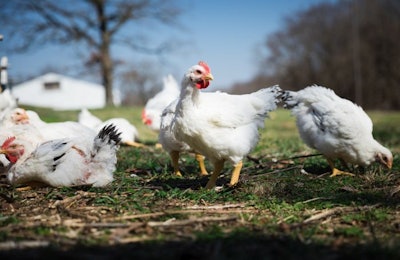
Cooks Venture has planted more than 21,100 hazelnut and fruit trees throughout their network of pasture-raised poultry farms in northwest Arkansas, advancing the company’s commitment to regenerative agriculture.
"We are on a mission to improve the food system across every dimension -- for farmers, animals, people and the planet through regenerative agriculture. This initial silvopasture planting is just the start. We'll continue to plant trees on an annual basis on both our farm and our network of poultry farmers, as it's a key piece of our regenerative program," stated Cooks Venture CEO and Founder Matthew Wadiak.
Benefits of silvopasture
Silvopasture integrates trees, pasture and forage into a single system, also known as the practice of agroforestry, to help improve land health, increase carbon sequestration and provide aerial predator protection, sun and heat protection, biodiversity and pollinator habitats, forage from fruit and nuts and increased insect activities.
"Hazelnut is one of the few plants that can tolerate the quantity and quality of nutrients that is in poultry excrement, and the poultry love hanging out in the shrubs, eating the hazelnuts and all the insects associated with these bushes," states Mark Shepard of Restoration Agriculture Development, the full service environmental consulting research and development firm who helped design the silvopasture.
Invested in slow-growth chicken breeds
Cooks Venture specializes in the production and processing of pasture-raised, slow-growth chickens. The company is dedicating to “building an alternative to America’s meat industry, to deliver great food from independent, regional farms,” according to the company’s website.
“As with everything we do, it all comes back to the breed. Our chickens are bred to thrive outdoors, spending their lives on pasture eating insects and native foliage and soon, hazelnuts," states Wadiak.
Slower-growing broilers have been advocated by the Global Animal Partnership (GAP), as well as animal rights groups – some of which are represented on the GAP board. A commitment tracker webpage shows that more than 180 businesses in the U.S. and Canada have pledged to join the slow-growth movement.
Like what you just read? Sign up now for free to receive the Poultry Future Newsletter.


















